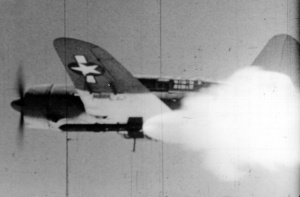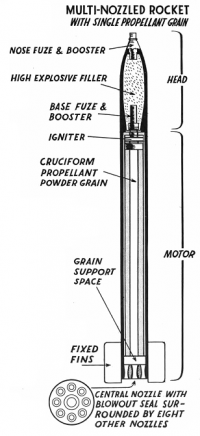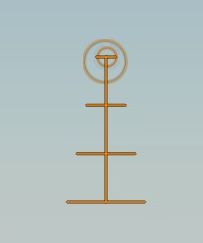Difference between revisions of "Rockets"
(some new work on this article. someone should explain how the ladder crosshair works ;)´) (Tag: Visual edit) |
Colok76286 (talk | contribs) (Edits) |
||
| (One intermediate revision by one other user not shown) | |||
| Line 1: | Line 1: | ||
| + | [[File:An SB2-C Helldiver firing a Tiny Tim rocket.jpg|alt=An SB2-C Helldiver firing a Tiny Tim rocket|thumb|An SB2-C Helldiver firing a Tiny Tim rocket]] | ||
== General Information == | == General Information == | ||
| − | A rocket is a type of ammunition that can be fired in flight, from a ground vehicle and from | + | A rocket is a type of ammunition that can be fired in flight, from a ground vehicle and from naval vessel. There are two main groups of rockets: anti-ground and anti-aircraft. |
Some rockets explode on impact and some have their own fuse. The rocket contains a thruster, fuel and explosive. | Some rockets explode on impact and some have their own fuse. The rocket contains a thruster, fuel and explosive. | ||
=== Vehicles carrying rockets === | === Vehicles carrying rockets === | ||
| − | + | ||
| + | For a list of vehicles see [[:Category:Suspended armaments|Suspended armaments]]. Most common on planes and helicopters it can also be found on ground vehicles and ships. | ||
| + | [[File:RocketMotors.png|thumb|436x436px|Multi-nozzle rocket description]] | ||
== Rocket structure == | == Rocket structure == | ||
| − | There are several types of rockets, but here is described | + | There are several types of rockets, but here is described a multi-nozzle rocket: |
| − | * | + | * Head |
| − | ** Nose & base | + | ** Nose & base fuse - What ensures an explosion after impact |
** High explosive - An explosive that destroys the target | ** High explosive - An explosive that destroys the target | ||
** Igniter - It allows the rocket to be launched not only after impact, but also in the air | ** Igniter - It allows the rocket to be launched not only after impact, but also in the air | ||
| − | * | + | * Motor |
** Cruciform propellant powder grain - Rocket fuel | ** Cruciform propellant powder grain - Rocket fuel | ||
** Grain support space - It ensures that the fuel does not overflow | ** Grain support space - It ensures that the fuel does not overflow | ||
| Line 21: | Line 24: | ||
== Rocket groups == | == Rocket groups == | ||
| − | |||
| − | === | + | === Unguided rockets === |
| − | The most common type of rockets | + | The most common type of rockets are: |
| − | === | + | === Proximity fuse rockets === |
| − | + | They are used mainly for anti-aircraft purposes, and a notable example of a plane featuring this weapon is the [[F-89D]], an interceptor jet aircraft. | |
== Aiming Rockets == | == Aiming Rockets == | ||
| − | To make sure your rockets hit you have to take into account many factors like distance, relative motion and accuracy of rockets. Modern planes have a ballistic computer which will do | + | To make sure your rockets hit you have to take into account many factors like distance, relative motion and accuracy of rockets. Modern planes and helicopters have the CCIP system, a ballistic computer which will do such calculations for you. However, you still have to make sure you fire the rockets from a distance and angle where dispersion is low. |
=== Planes === | === Planes === | ||
| − | [[File:Rocket Aiming.jpg|thumb|The | + | [[File:Rocket Aiming.jpg|thumb|The unguided rocket aiming crosshair.]] |
| − | On | + | On most pre-modern jet aircraft there is only a ladder crosshair which helps aiming rockets. Each gap on the ladder is equal to 250 m. One must still calculate the rocket drop over distance phenomenon and adjust accordingly. On naval arcade mode, a rangefinder with metres distance is provided on most vehicles, and this can assist aiming of rockets. |
Latest revision as of 21:01, 11 November 2024
Contents
General Information
A rocket is a type of ammunition that can be fired in flight, from a ground vehicle and from naval vessel. There are two main groups of rockets: anti-ground and anti-aircraft.
Some rockets explode on impact and some have their own fuse. The rocket contains a thruster, fuel and explosive.
Vehicles carrying rockets
For a list of vehicles see Suspended armaments. Most common on planes and helicopters it can also be found on ground vehicles and ships.
Rocket structure
There are several types of rockets, but here is described a multi-nozzle rocket:
- Head
- Nose & base fuse - What ensures an explosion after impact
- High explosive - An explosive that destroys the target
- Igniter - It allows the rocket to be launched not only after impact, but also in the air
- Motor
- Cruciform propellant powder grain - Rocket fuel
- Grain support space - It ensures that the fuel does not overflow
- Central nozzle with blowout seal surrounded by eight other nozzles - Rocket propulsion
- Fins - For direct rocket flight
Rocket groups
Unguided rockets
The most common type of rockets are:
Proximity fuse rockets
They are used mainly for anti-aircraft purposes, and a notable example of a plane featuring this weapon is the F-89D, an interceptor jet aircraft.
Aiming Rockets
To make sure your rockets hit you have to take into account many factors like distance, relative motion and accuracy of rockets. Modern planes and helicopters have the CCIP system, a ballistic computer which will do such calculations for you. However, you still have to make sure you fire the rockets from a distance and angle where dispersion is low.
Planes
On most pre-modern jet aircraft there is only a ladder crosshair which helps aiming rockets. Each gap on the ladder is equal to 250 m. One must still calculate the rocket drop over distance phenomenon and adjust accordingly. On naval arcade mode, a rangefinder with metres distance is provided on most vehicles, and this can assist aiming of rockets.






